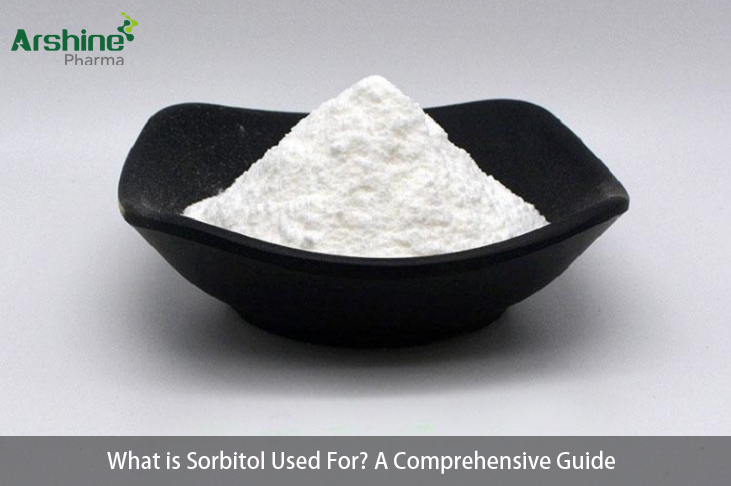
Sorbitol, a versatile sugar alcohol with various applications in the food, pharmaceutical, and cosmetic industries, serves a multitude of purposes beyond just sweetening products. Its unique properties make it a valuable ingredient in a wide range of products, from sugar-free candies to medicinal syrups and skincare products. In this comprehensive guide, we will explore the diverse uses and applications of sorbitol, shedding light on its significance in different sectors and its impact on our daily lives.
Sorbitol, also known as glucitol, is a sugar alcohol that naturally occurs in fruits like apples, pears, and cherries. It can also be synthesized from glucose. Sorbitol is characterized by its sweet taste but contains fewer calories than traditional sugars, making it a popular choice for sugar-free and reduced-calorie products.
1. Food and Beverage Industry:
A. Sweetener: One of the primary uses of sorbitol in the food and beverage industry is as a sugar substitute. Its sweetening properties are particularly beneficial for individuals with diabetes or those seeking to reduce their calorie intake. Sorbitol can be found in a variety of sugar-free and reduced-sugar products, including:
- Sugar-free candies: Sorbitol provides the sweet taste without the glucose content that can spike blood sugar levels.
- Sugar-free gums: Sorbitol's sweetening ability makes it a common ingredient in chewing gums.
- Sugar-free syrups: In pancake syrups and dessert toppings, sorbitol offers sweetness without the sugar.
- Sugar-free and reduced-sugar baked goods: Sorbitol can replace sugar in cookies, cakes, and other baked products.
B. Humectant: Sorbitol's hygroscopic (water-attracting) properties make it an excellent humectant in food products. It helps retain moisture, preventing products like bread and cakes from becoming stale too quickly. Additionally, sorbitol is used in the production of soft and chewy foods, such as cookies and candies, by providing moisture retention and improving texture.
C. Stabilizer and Thickener: In frozen desserts like ice cream, sorbitol serves as a stabilizer, helping to maintain the product's structure and texture. It can also function as a thickening agent in various food applications, such as sauces and dressings.
D. Bulking Agent: Sorbitol acts as a bulking agent in some low-calorie and sugar-free food products. It provides volume and texture, allowing these products to mimic the mouthfeel of traditional, higher-calorie options.
2. Pharmaceutical and Medicinal Applications:
A. Laxative: Sorbitol has a well-known and important medical use as a mild laxative. It is often used to relieve constipation by drawing water into the intestines, softening stool, and promoting bowel movements. Sorbitol-based laxatives are available over-the-counter and are commonly used in clinical settings when a gentle, short-term solution is needed.
B. Excipient: In the pharmaceutical industry, sorbitol serves as an excipient—a non-active ingredient—in the formulation of various medications. It can be used as a filler, binder, or sweetener in the production of tablets, capsules, and liquid formulations.
C. Coating Agent: Sorbitol is utilized as a coating agent for tablets and capsules to improve their appearance, taste, and ease of swallowing. It can also protect the medication from moisture and extend its shelf life.
D. Cough Syrups and Oral Solutions: Sorbitol is often included in liquid medications, such as cough syrups and oral solutions, to enhance palatability and provide sweetness. Its humectant properties can help maintain the stability of these formulations.
3. Cosmetic and Personal Care Products:
A. Skincare Products: Sorbitol is found in various skincare products, including lotions, creams, and moisturizers, due to its humectant properties. It attracts and retains moisture, helping to keep the skin hydrated and prevent dryness.
B. Toothpaste and Oral Care Products: In toothpaste and mouthwash, sorbitol is used to enhance the product's texture, taste, and mouthfeel. Its humectant properties help maintain the consistency of the toothpaste and keep the mouthwash from drying out.
C. Hair Care Products: Some shampoos, conditioners, and hair styling products contain sorbitol to improve texture, enhance product spreadability, and promote moisture retention in the hair.
4. Industrial and Chemical Applications:
A. Plastics and Polymers: Sorbitol is used in the production of certain plastics and polymers. It can act as a plasticizer, helping to increase the flexibility and durability of these materials.
B. Textile Industry: In the textile industry, sorbitol is employed as a softening agent and a finishing agent for fabrics. It can improve the feel and appearance of textiles.
C. Printing Inks: Sorbitol is used in the formulation of some printing inks, where it serves as a humectant and stabilizer, helping to maintain ink quality.
D. Chemical Synthesis: Sorbitol has applications in chemical synthesis, particularly in the production of other chemicals and as a starting material for various reactions.
5. Other Uses:
A. Diabetic and Sugar-Free Products: Sorbitol is a key ingredient in diabetic-friendly and sugar-free products, offering individuals with diabetes or those watching their sugar intake a sweetening option without causing spikes in blood sugar levels.
B. Tobacco Industry: In the tobacco industry, sorbitol can be used as a humectant to maintain the moisture content of tobacco products and prevent them from drying out.
C. Veterinary Products: Sorbitol may also be found in veterinary medications and pet care products, serving similar purposes as in human pharmaceuticals.
D. Specialty Foods: Sorbitol is used in specialty foods, including sugar-free and low-calorie ice creams, jams, and jellies, to provide sweetness and maintain product quality.
E. Fermentation and Food Processing: In some food processing applications, sorbitol is used as a fermentation substrate or as a chemical intermediate in the production of other food ingredients.
Conclusion:
Sorbitol (CAS No. 50-70-4) is a multifaceted sugar alcohol with a wide array of applications across diverse industries. Its sweetening properties, combined with its humectant and texturizing abilities, make it a valuable ingredient in food, pharmaceuticals, cosmetics, and various other products. Whether it's enhancing the taste of sugar-free candies, providing moisture to skincare products, or serving as a gentle laxative in medicine, sorbitol plays a significant role in improving the quality of life for consumers worldwide. Its versatility and wide-ranging applications underscore its importance in today's consumer products and industrial processes.